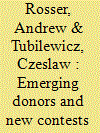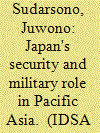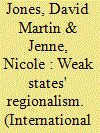| Srl | Item |
| 1 |
ID:
143628


|
|
|
|
|
| Summary/Abstract |
The rise of emerging donors has unleashed new political contests over aid policy, some of which have occurred at the domestic level. This article locates the special edition's analysis of these contests within the existing literature on emerging donors, draws out the key findings of included papers, and considers their implications for policy. It argues that domestic contests have had significant influence over aid policy in both emerging and established donors, the agendas at work have varied from case to case reflecting countries' different political economies, and aid policies represent a ‘work-in-progress’ rather than an expression of immutable models.
|
|
|
|
|
|
|
|
|
|
|
|
|
|
|
|
| 2 |
ID:
185360


|
|
|
| 3 |
ID:
159109


|
|
|
|
|
| Publication |
New Delhi, National Maritime Foundation, 2018.
|
| Description |
318p.pbk
|
| Standard Number |
9788193299852
|
|
|
|
|
|
|
|
|
|
|
|
Copies: C:1/I:0,R:0,Q:0
Circulation
| Accession# | Call# | Current Location | Status | Policy | Location |
| 059379 | 359.03/CHA 059379 | Main | On Shelf | General | |
|
|
|
|
| 4 |
ID:
145768


|
|
|
|
|
| Summary/Abstract |
Since the Association of Southeast Asian Nations (ASEAN) expanded its institutional outreach to span the broader Asia Pacific and new policy areas, a dominant orthodoxy has placed the organization at the center of the region's international order. More recently, uncertainty in the context of China's rise sheds doubt on ASEAN's apparent centrality to its procedurally driven transformation of foreign relations across East Asia. While theories of cooperation explain why and when minor powers choose to pool their resources, the reverse logic has hardly been considered. This paper shows that the particular type of ASEAN regionalism is not only a product of weak states' cooperation but that the lack of capacity also sets the limits for the regional project. Two case studies on intramural security elicit the limited effectiveness of ASEAN's endeavor to develop into a security community. Meanwhile, as an examination of the South China Sea dispute demonstrates, its attempt to export its norms has rendered it vulnerable to the intervention of more powerful actors and increasingly side-lined by the evolution of great power rivalry.
|
|
|
|
|
|
|
|
|
|
|
|
|
|
|
|